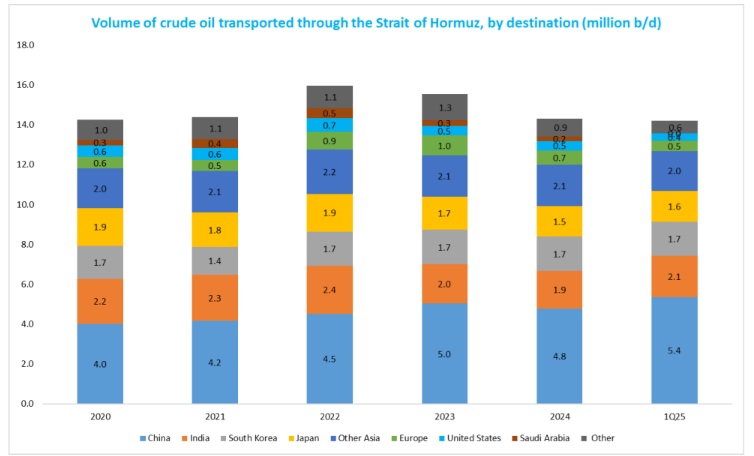An Imperfect Sandstorm: Tracing the economic costs of elevated aggression on growth & asset classes,

FinTech BizNews Service
Mumbai, June 24, 2025: The upended, Israel-Iran confrontation, have put the global markets on tenterhooks, with a very likely US participation (more explicit now than implicit) roiling the nervous markets and asset managers, chiefly with disjointed global supply chains and elevated crude prices, as per a special research report, authored by Dr. Soumya Kanti Ghosh, Member, 16th Finance Commission & Group Chief Economic Advisor, State Bank of India.
❑ With world attention fixated to the Strait of Hormuz, the only sea route from the Persian Gulf to the open ocean, with 20% of the world's oil transits passing through the troubled waterways, the needle has also moved to countries like us with a substantial dependency on oil imports since India imports nearly 90% of its crude oil requirements. About two million barrels per day of this, out of 5.5 million, transits through the Strait of Hormuz
• In 2024, oil flow through the strait averaged 20 million barrels per day (b/d), or the equivalent of about 20% of global petroleum liquids consumption. Large volumes of oil flow through the strait, and very few alternative options exist to move oil out of the strait if it is closed
• Iran is the 9th-largest oil producer, despite international sanctions, so a large disruption in Iranian production or export would leave supply very precarious dent on global supply chains, with profound consequences for the global economy
• Though, India does not buy any oil from Iran yet Hormuz is crucial for India as 40% of oil imports still passes through this waterway between Iran and Oman....diversification of supply sources to 40+ counties counter checks the cost shock though
❑ Global shipping lines, tagged with crude transportation, are mirroring the elevated tensions with the Chinese Import crude oilTanker Freight Index (CTFI) vaulting up, while the Friday close of Baltic Dirty Tanker Index shows the levels still below recent highs... an interesting thing to watch would be the pricing of maritime insurance, a true reflector of elevated volatilities
❑ Under a Base case scenario, the jump in crude prices can be restricted to $82-$85 which may not be too restrictive for our economic indicators viz. CAD / BoP.... Brent has averaged ~$74 during the last 12 months, whereas its LPA (Long Period Average) of 5 years is $78
A chequered History of once allies, turned foes is reflective of the restless Middle East
Contrarian, as it may seem, Iran was one of the handful of countries from the Islamic world that recognized the formation of a full-fledged Jewish state back in 1948...The first Arab-Israeli war saw Iran not participating while establishing ties with Israel post war, second country after Türkiye to do so influenced by the “periphery doctrine’ of Israel that emphasized upon building strategic ties with Non-Arab jurisdictions
❑ Iran maintained close ties with both US, as also Israel under the rule of erstwhile ruler Shah Mohammad Reza Pahlavi, even selling oil to Israel during Arab economic boycott
❑ The overthrow of the Shah regime was a watershed moment in the bilateral relations, leading to the establishment of a deeply religious state in Iran, altering its stance on Israel to view it as an occupier of Palestinian territories
❑ Post revolution, Iran aimed to expand its influence in an oil rich landscape, challenging regional powers like Saudi Arabia and Israel, both closest allies of US that knew the economic costs of a vaulting crude, and its impact on the local economy (the oil shock of 1974 and the runaway inflations).... Also, the need to keep the war in Afghanistan in favour of western powers that were losing to the Soviet advances, kept US much hooked to the Middle East
❑ Iran’s ceasing support for Kurdish-Iraqi separatists, reduced hostilities post the Iraq wars affected the regional balance of power while its nuclear ambitions, and strife torn geographies tilted the balance to an uncertain trajectory
❑ Iran's support for beleaguered militant groups like Hezbollah and Hamas, in confrontation with Israel and other nations including the USA further escalated tensions but Israel, long worried of Iran’s clandestine outreach in nuclear technology, moved forward only after decapitating Hamas decisively, even as Middle East appears to be losing the sway it had on oil prices